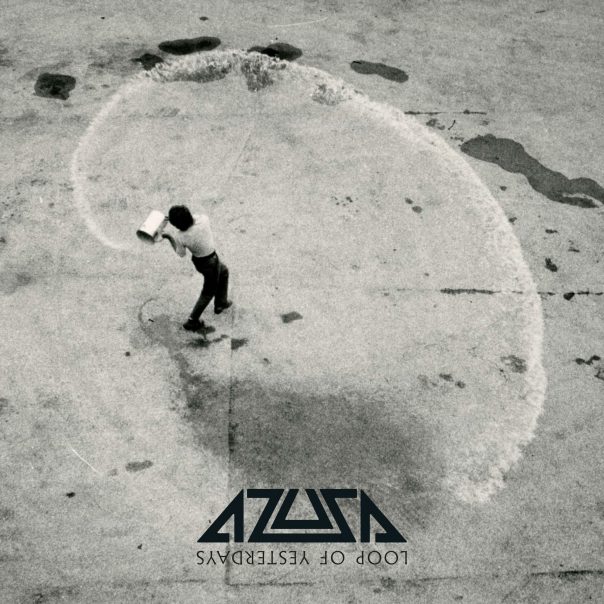ALBUM REVIEW: Azusa pushes beyond all pitfalls with ‘Loop of Yesterdays’

Bassist Liam Wilson, formerly of The Dillinger Escape Plan, and Extol luminaries Christer Espevoll (drums) and David Husvik (guitar) had already put Azusa over with prog metal fans. But then you hear Eleni Zafiriadou’s voice, which bridges the gap between old-school screamo and Kate-Bush-style melody, effectively pushing this band to the elite of Solid State Records. It goes without saying that Azusa’s debut, Heavy Yoke enjoyed critical acclaim. Loop of Yesterdays continues that winning streak. This sophomore album elevates Azusa from an interesting one-off to an established force in forward thinking aggressive music.
Loop of Yesterdays
Azusa
Solid State Records, April 10
Loop of Yesterday often manages to be heavier than Heavy Yoke without losing Zafiriadou’s unique singing voice. Opener “Memories of an Old Emotion” crashes with a frenzied assault of technical riffing and feral screaming. Until, that is, ‘90s dream-pop vibes suddenly take over. Azusa not only contrasts these two extremes, but synthesizes them into a true hybridization. It’s why the concussive groove of single “Monument” so easily coexists with its dissonant guitar strains, gothic spoken-word delivery and haunting soundscapes. It’s not about genre crossovers, but about writing good songs.
Complete with a guitar solo by Testament’s Alex Skolnick, “Detach” lends itself to the subversive, unpredictable thrash of Voivod and early Meshuggah. Zafiriadou’s versatil harsh singing works well in both math-rock-inspired hardcore and progressive thrash, but she always finds a way to slip some melodic refrains in the mix. Espevoll and Husvik’s background in Extol speaks to their experience with this vein of unorthodox extreme metal, giving the riffs and beats of “Kill / Destroy” a comparable balance of old-school brawn and weird tangents.
Azusa benefits from the intuitive chemistry of its members, giving this album a sound as unified as it is unique. It’s why the overtly metallic riffs and spectral singing on “One Too Many Times” actually add up to compelling songwriting. This band isn’t satisfied to throw different sounds together and see what happens. They want you to remember what’s being played. Busy tom-tom drumming and hypnotic guitar work not withstanding “Seven Demons Mary” Zafiriadou’s distraught caterwauls and brooding moans etch themselves in your brain. Though harmonically dense and rhythmically complex, nothing overshadows the echoing hooks that permeate its runtime.
Along with the atmospheric arpeggios of brief guitar interlude “Support Becomes Resistance,” “Loop of Yesterdays” does away with aggression entirely for neo-classical balladry on par with King Crimson and Yes. Foreboding strings enter the arrangement toward the end, as Zafiriadou’s lyrics contrast constant change with eerie familiarity. That’s really the heart of Azusa: constantly keeping you guessing while rooting all ideas in tradition. You can almost forget about the stylistic crossovers, as they come together so naturally and remain faithful to emotive, time-tested songwriting.
Perhaps the most refreshing aspect of Azusa is how it pushes all of the musicians involved into new territory. A song like “Rapture Boy” is too post-hardcore for Extol and too metal for Dillinger Escape Plan. But it’s assembled with such precision that all you can do is head-bang along. Slow-burning tracks like “Skull Chamber” even tip a hat to jazz fusion as harmonic tension and nonlinear rhythm keeps you at the edge of your seat. Double-bass rolls and pixie-like falsetto notes shouldn’t work, but such ventures work just as well as the protracted tremolo picking and insane screeches that follow.
The harmonized leads of “Golden Words” traverse traditional metal grandeur and menacing death metal in the Swedish tradition, bringing the album its closest to conventional metal. Zafiriadou retains her soft timbre, but still cuts through the ragged riffing. It’s a testament both to her musical presence and how much producer David Husvik, mixer Nick Terry and engineer Jens Bogren did to give Loop of Yesterdays its balance of clarity, intensity and nuance.
Though only two minutes long, closer “Aching Ritual” covers as much ground as the rest of the album. You want melodic leads? They’re there in spades. You want atonal oddity? It’s right around the corner. With shapeshifting drumming and ever-powerful guitars playing and vocals, Azusa’s niche could not be more finely carved.
Most bands with the subscript “featuring members of bands you know” relegate themselves to novelty or cash-grab status. This album pushes Azusa beyond both pitfalls. Any fan of weird metal will have a lot to digest, but Zafiriadou’s dynamic singing voice could easily be a gateway for fans of ‘90s indie rock or post-punk. Scratch that—any self-respecting fan of interesting music should listen to Loop of Yesterdays.
Follow editor Max Heilman at Twitter.com/madmaxx1995 and Instagram.com/maxlikessound.
